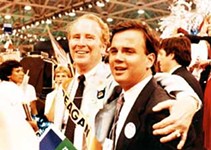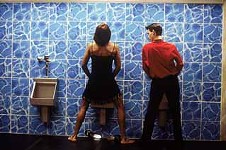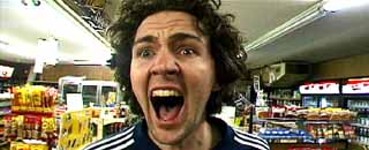Licensed to Kill
1997, NR, 79 min. Directed by Arthur Dong.
REVIEWED By Russell Smith, Fri., Oct. 24, 1997
Higher on the moral hierarchy than a passion to see evil avenged, higher even than a mindless reflex to forgive, is the desire to understand evil's root causes. Case in point: Filmmaker Arthur Dong (Coming Out Under Fire), a onetime victim of gay-bashing whose rigorously unsentimental documentary gives seven murderers of homosexual men a chance to explain, as best they can, why they did it. The almost clinical restraint of Dong's Sundance and Berlin Film Festival award-winner only enhances its staggering emotional impact. These men are, in one sense, textbook archetypes. Their overt excuses range from panic over alleged advances by the victim to repressed homosexual feelings, childhood abuse, impersonal thuggery directed at effeminate “punks,” and amorphous paranoia about “the homosexual movement.” Dong doesn't pretend to find any profound significance in these familiar rationales, or in the hate-drenched cant of Pat Robertson and Ralph Reed, seen with like-minded televangelists in TV clips. The real revelations come via the naked simplicity of talking-head speeches by the killers, prompted by only minimal questioning from Dong. By giving his subjects total license to speak their minds, and by sustaining takes long beyond a rhythm that would accommodate glib sound bites, the director forces them toward real soul-searching. You can see the unease, pain, and confusion on these men's faces as they carry on what amounts to audible internal dialogues, trying to make sense of their own tortured reasoning as it feeds back to them in an extended loop. Though each interview is accompanied by victims' portraits and gruesome police photos of the murder scenes, there are no overt attempts to jerk at our heartstrings. No interviews with tearful lovers or families, no fist-shaking rhetoric by gay/lesbian spokespersons. Grasping the reality of “outrage fatigue,” Dong instead forces us to painfully engage with the undeniable humanity of his vile subjects. The point is not to make banal, intellectually bogus assertions that evil is in all of us, we're unfit to judge these men, blah, blah, blah. Rather, I think Dong is proposing that most hate-motivated behavior (not just gay-bashing) is the result of deep-seated emotional anguish, often of a non-specific nature, finding an object in some external phenomenon made fearsome by our inability to understand it. “I was just takin' out aggression and hatred on whoever was there,” one murderer confesses under Dong's low-key probing. With no ambivalence, I wish that the Christian conception of hell were literally true so each of these lowlifes could suffer an eternity of intolerable pain, consigned to their fates by the god several of them bizarrely cite as inspiration. But thanks to Arthur Dong, I also feel a deep sense of relief as I see transient but unmistakable flares of regret in at least some of their faces. They're human, after all, not inscrutable monsters from some morality-free parallel dimension. This insight, however depressing, is a gift of incalculable value.
A note to readers: Bold and uncensored, The Austin Chronicle has been Austin’s independent news source for over 40 years, expressing the community’s political and environmental concerns and supporting its active cultural scene. Now more than ever, we need your support to continue supplying Austin with independent, free press. If real news is important to you, please consider making a donation of $5, $10 or whatever you can afford, to help keep our journalism on stands.








